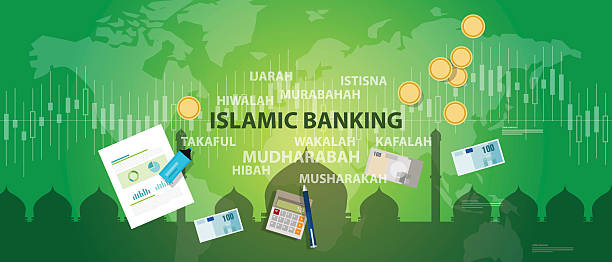Islamic Banking
Islamic banking involves the banking activities and procedures in accordance to sharia (Islamic law). Islamic banking system has been used to develop Islamic economics due to its practicality in these states. Islamic banking systems have put across a robust aspect of organizational culture as it is mainly based on a specific group of people defined by one religion, culture, beliefs, history and tradition.

In line with this, the foundation of these banks was very purposeful with a specific target group. This paper is premised on the Jordan Islamic bank. This is because Jordan Islamic bank posseses the characteristics of a fully fledged bank and has fulfilled the legislative requirements over the years.
According to Nassouh (2016), the Jordan Islamic bank was the first Islamic bank in the world that was established through specific regulations. The bank was started in 1979. The tedious process of starting the bank headed by Dr. Sami Hamoud who struggled through odds to achieve an economically viable bank that was still Islamically pure.
He had gained experienced working in Jordan National Bank, a conventional bank for 22 years. As noted by(Maali & Napier, 2010) it is through his working experience, he noticed that the charging of interest on loans and led to adverse economic and social consequences that led to bankruptcy that affected the poor people. The observations motivated him to start a bank that would serve the Jordanians effectively. However, governor to the Central Bank of Jordan and the large conventional banks in Jordan at the time were not ready to support his ideas.
Dr. Sami Hamoud got some supporters who formed a preparation committee that aimed at gaining political and financial support but were not so much endowed with political or ideological knowledge. Hamoud was supported by the royal family in Prince Muhammad Al-Faisal Al- Saud who showed interest and was willing to invest in the bank.

Hamoud made several contacts that assisted him and the preparatory committee to come up with an act in 1977 and it underwent through various legislative processes and in 1978 it was accepted and the bank was founded on this act (Act No. 13 established in 1978). The act is referred to as The Jordan Islamic Bank for Finance and Investment Act that regulates many of the accounting practices and provides rules on profit measurement.
Since its establishment, Jordan Islamic Bank is still focused on giving the best to its esteemed customers by making sure it comes up with new innovative services and products that enhance the trust of the clients. The bank has maintained a smooth customer service system by offering quality and fast services to the clients. Nassouh (2016), noted in 2015 the bank obtained an award of the best Islamic bank in Jordan from the EMEA finance magazine, London that has a specialty in finance matters.

The bank was awarded for the third consecutive time for being the best because of its efforts as an Islamic bank in Europe, Middle East and Africa. The award was given after an assessment in retail financial services sector, investment banking and assests management (Nassouh, 2016). In 2014, the bank was honored during EMEA finance awards ceremony for Middle East banking achievements in Emirates (Nassouh, 2016).
The bank was awarded for its solid performance, its successful management, continual growth in market shares in assets, financings, deposits and profits in addition to its broad based sector financing (Nassouh, 2016). The bank’s awards were also in line with its modern technological services, keeping an eye on non-performing loans and also its impressive efforts in trying to achieve its five year sustainability strategic plan (Nassouh, 2016).
The bank holds a strong position globally as a pioneer in Islamic banking and has shown great success in the assets, financing, deposits, profits, provisioning for non-performing loans and its continued goal to offer the best banking services to its clients. The bank faces challenges in the political and economic sectors as well as high levels of competition from the dynamically growing banking sector. Jordanian and Arab financial experts acknowledge that the bank faces risks in real estate, medical and commercial banking and industrial sectors.
Nassouh(2016), noted the bank has enjoyed market capitalization over the years with much dominance in the banking sector. The market gains by the bank have grown over the years and as of 2013, the bank achieved a total profit of JD (65) million and a net profit of JD (45) million after tax (Nassouh, 2016). The bank also has grown in terms of the dividends declared to its shareholders and as of 2013, the bank declared 15% in cash and 20% bonus shares (9).
The growth in the market dominance has grown and amongst other Islamic banks, Jordan Islamic bank enjoys 63.4% in the asset finance, 65.8% in deposits and 61.2% in finance banking. Among other banks, the bank has also displayed great competitiveness as it poses a market dominance and capitalization with 7.7% in asset finance, 10.7% in deposits and 12.1% in finance banking. (“Jordan Islamic Bank spurs growth in the kingdom”, 2014) elaborates that the increased market growth for the bank can be attributed to the continued provision of quality banking services and products as well as the innovativion by the bank.
The bank also enjoys a strong workforce with a high number and highly qualified employees enhancing its competitive edge. The bank has roles even in other countries as it carries out dealings with other banks globally on behalf of its clients and the banks are satisfied with the transactions thus increasing its popularity worldwide.
The bank is governed by the Sharia Supervisory board which has three members inclusive of the chairman, H.E. Dr. Abd Sattar Abu Goddeh, the vice chairman, H.E. Dr. Mahmoud Al Sartawi and one member, H.E. Dr. Mohammad Khair Al-Issa (Nassouh, 2016). The board has a major role in ensuring that the bank’s activities and transactions are in line with the Sharia law (Sabeen, 2016).
The board’s functions include; approving all the bank contracts, ensuring periodical reviews of the bank operations to ensure that they remain within Sharia requirements and regulations. The board also reports to the shareholders and also advises the bank on general matters so that it upholds Sharia law and expectations and with higher standards. In general, the board plays a guiding role to the bank keeping it on tract making it a vital body in the bank’s operation systems.
The bank displays high levels of innovation and in the recent times, the bank has come up with special and unique products that aim at eradicating poverty in the society and ensuring that the clients achieve affordable services that will empower them financially and spiritually as well. Some of the products include; the family card, Social services/ Joint Insurance fund and sharia product for financing education. The bank introduced the family card in 2015 in conjunction with Supreme judge department of the Sharia execution courts in order to ease the process of administering justice to the victims of family feuds.
The card will assist victims of marital alimony, kids’ expenditure, dowry or compensation for divorce to access their wining amounts without having to visit the bank oftenly making the process much easier for them.
The Social services/ Joint Insurance funds was introduced in order to ensure that the affected clients are able to indemnify part of any damage incurred in a joint manner in accordance with takaful principles. The takaful principles indicate that the participants will help themselves without additional obligations or risks, thus making the insurance compensation process easier for the target clients. The sharia product for financing education regarded to as “Iqra’a” was introduced in order to assist the bank clients to pay school fees to schools, colleges and universities in installments at the start of every academic session.
The bank finances the cost of education and the clients can pay them in installments to the bank, thus making it easy and making education affordable to all. The financing system is aimed at meeting the client’s needs including individual retail sector. The bank aims at ensuring that it finances education at a ratio of 100% with stipulations of installments reaching 84 months (Nassouh, 2016). The client can visit any bank out of the 80 branches in the kingdom as well as cash offices and other service providers that were signed with cooperation agreements including schools, colleges and universities ensuring that all clients benefit from the product (Nassouh, 2016).
The products were set and delivered in accordance with Sharia law. The family card was launched in conjunction with Sharia judge department, meaning the Sharia execution courts having been partakers, they must have approved of the product. The Social services/ Joint Insurance fund is aimed at helping one another and being in line with takaful principles, the Sharia supervisory board must have approved of it.
Accordding to Nassouh (2016), the education financing product was launched and approved by the Sharia Supervisory board according to Sharia mode financing utilities forward Ijara in order to cover the education fees in line with Ijara contracts’ controls and stipulations. The products aim at meeting the citizen needs as they all aim at making the banking system easier for the clients (Maali & Napier, 2010). On the other hand, they are very much allied to eradicating poverty levels for the citizens and in this case, the enhancement of education is vital as well as the insurance services and easing of the court system for the citizens.
The Jordan Islamic Bank aims at enhancing the lives of the clients and making the banking system an easier process for the citizens. Money is viewed as a medium of exchange and store of value but not as a commodity (“Fitch Affirms 3 Jordanian Banks; Revises Jordan Islamic Bank And Bank Of Jordan’s Outlook”, 2016). The other conventional banking systems view money as a commodity, a medium of exchange and a store of value. The conventional banks earn money by charging interest on loans, and fees for services, whereas Jordan Islamic bank earns money by profit and loss sharing, leasing, trading and other contracts of Sharia exchange.
The products invented by Jordan Islamic banks are very much different as they focus on empowering the clients in their financial needs and spiritual needs despite focusing on making profits and enhancing the bank’s growths. The conventional banks products are aimed at making profits thus they include aspects of lending loans to clients at reduced interest rates as well as increasing the time frame for loan payment. The uniqueness and usefulness of their products to clients has been vital in enhancing their competitiveness in the market (Parker, 2016).
References
Fitch Affirms 3 Jordanian Banks; Revises Jordan Islamic Bank And Bank Of Jordan’s Outlook. (2016). Reuters. Retrieved 20 April 2016, from http://www.reuters.com/article/idUSFit952256
Jordan Islamic Bank spurs growth in the kingdom. (2014). Worldfinance.com. Retrieved 20 April 2016, from http://www.worldfinance.com/markets/jordan-islamic-bank-spurs-growth-in-the-kingdom
Maali, B. & Napier, C. (2010). Accounting, religion and organisational culture: the creation of Jordan Islamic Bank. J Islamic Acc And Bus Res, 1(2), 92-113. http://dx.doi.org/10.1108/17590811011086705
Nassouh, H. (2016). JIB | Jordan Islamic Bank :::.. Jordanislamicbank.com. Retrieved 20 April 2016, from http://www.jordanislamicbank.com/en
Parker, M. (2016). Jordan Islamic Bank Rides the Crest. Arabnews.com. Retrieved 20 April 2016, from http://www.arabnews.com/node/311399
Sabeen, S. (2016). Saleem, Sabeen. “Islamic Internatio Nal Rating Agency (IIRA) Reaffirms Shari ’A Quality Rating Of Jordan Islamic Bank (JIB)”.. Islamic International Rating Agency. Retrieved 20 April 2016, from http://www.iirating.com/Documents/PressReleasePdf/JIB-SQR-PR